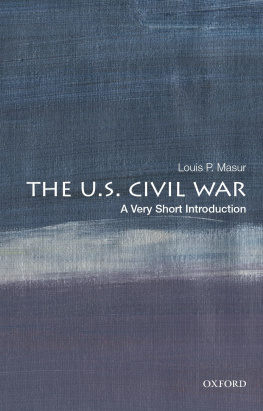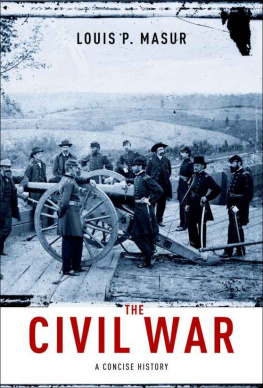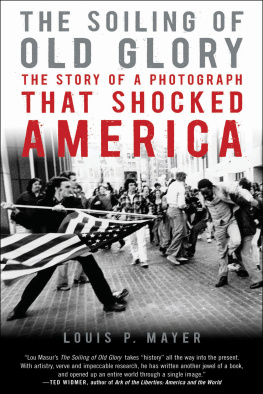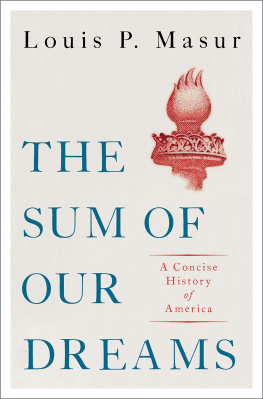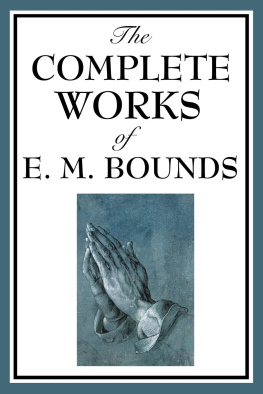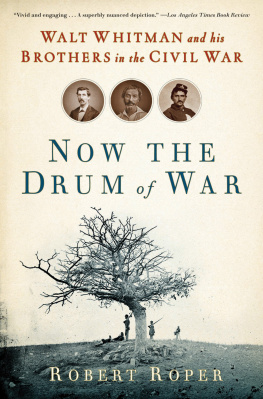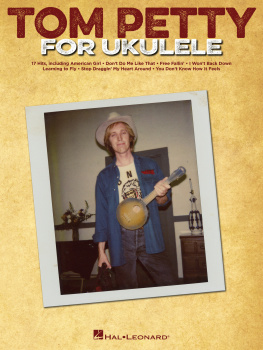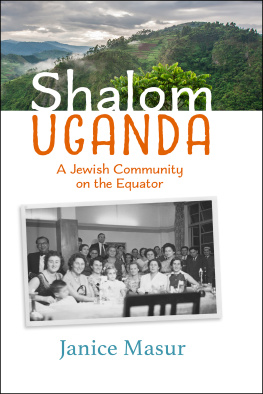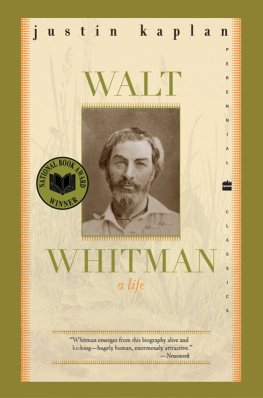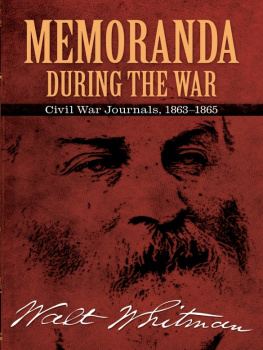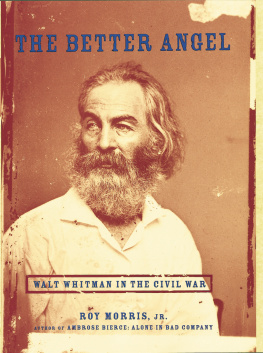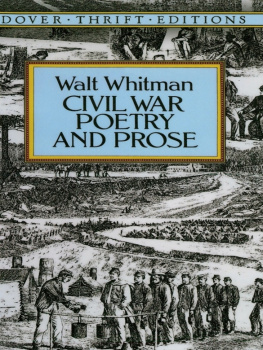...the real war
will never get
in the books
...the real war
will never get
in the books
Selections from Writers During the Civil War
Edited by
LOUIS P. MASUR

Oxford University Press
Oxford New York
Athens Auckland Bangkok Bombay
Calcutta Cape Town Dar es Salaam Delhi
Florence Hong Kong Istanbul Karachi
Kuala Lumpur Madras Madrid Melbourne
Mexico City Nairobi Paris Singapore
Taipei Tokyo Toronto
and associated companies in
Berlin Ibadan
Copyright 1993 by Louis P. Masur
First published in 1993 by Oxford University Press, Inc.,
200 Madison Avenue, New York, New York 10016
First issued as an Oxford University Press paperback, 1995
Oxford is a registered trademark of Oxford University Press
All rights reserved. No part of this publication may be reproduced,
stored in a retrieval system, or transmitted, in any form or by any means,
electronic, mechanical, photocopying, recording, or otherwise,
without the prior permission of Oxford University Press.
Library of Congress Cataloging-in-Publication Data
the real war will never get in the books
Selections from Writers During the Civil War
edited by Louis P. Masur.
p. cm.
Includes bibliographical references and index.
ISBN 0-19-506868-8
ISBN 0-19-509837-4 (PBK.)
1. Authors, American19th centuryCorrespondence.
2. United StatesHistoryCivil War, 18611865Literary collections.
3. United StatesHistoryCivil War, 18611865Personal narratives.
4. Authors, American19th centuryDiaries.
5. American literature19th century.
I. Masur, Louis P.
PS 1 28.H39 1993
810.8'0358'09034dc20 9224446
The following page is regarded as an extension of the copyright page.
2 4 6 8 10 9 7 5 3 1
Printed in the United States of America
The author gratefully acknowledges considerations granted by the following sources:
Henry Adamss letters reprinted, by permission of Harvard University Press, from The Letters of Henry Adams, Vol. 1: 18581868, edited by J. C. Levenson et al. Copyright 1982 by Harvard University Press.
Louisa May Alcotts journal reprinted by permission of Houghton Library, Harvard University.
Lydia Maria Childs letters reprinted courtesy of the Department of Rare Books, Cornell University Library; the William L. Clements Library, the University of Michigan; and Houghton Library, Harvard University.
Ralph Waldo Emersons journals reprinted, by permission of Harvard University Press, from The Journals and Miscellaneous Notebooks of Ralph Waldo Emerson, Vol. 15: 18601866, edited by Linda Allardt and David Hill. Copyright 1982 by Harvard University Press.
Charlotte Fortens journals reprinted, by permission of Oxford University Press, from The Journals of Charlotte Forten Grimk, edited by Brenda Stevenson. Copyright 1988 by Oxford University Press.
Nathaniel Hawthornes letters reprinted, by permission of the Ohio State University Press, from the Centenary Edition of the Works of Nathaniel Hawthorne, Vol. XVIII, The Letters, 18571864. Copyright 1987 by the Ohio State University Press.
William Gilmore Simmss letters, reprinted by permission of the University of South Carolina Press, from The Letters of William Gilmore Simms. Vol. 4 and Vol. 6, edited by Mary Simms Oliphant. Copyright 1955, 1982 by University of South Carolina Press.
Harriet Beecher Stowes letters reprinted courtesy of the Stowe-Day Foundation.
Walt Whitmans letters reprinted, by permission of New York University Press, from The Correspondence of Walt Whitman, Vol. 1: 18421867, edited by Edwin Haviland Miller. Copyright 1961 by New York University.
For Benjamin and Sophie
and Jonathan, Molly, Sam, Max, Gracie,
Jackson, Moses, and Zo
the luckiest
Thing is having been born
MARK STRAND
Preface
The Civil War was a written war. It was written by soldiers who kept diaries. It was written by family members who corresponded with soldiers at the front. It was written by journalists who reported from the battlefields and by editors who reshaped their newspapers and magazines to accommodate the desire for news of the war. And it was written by the nations writers. These writersthe novelists, essayists, and poetsstruggled to capture the texture of the extraordinary and the everyday. One writer who contemplated more deeply than most the meaning of this written war was Walt Whitman: I have become accustomed to think of the whole of the Secession War in its emotional, artistic and literary relations.
The literary dimensions of the Civil War have eluded us. From the start, critics have searched for timeless works of literature inspired by the war. In seeking some American version of The Iliad, they have focused on what was written about the war following the war and have neglected what was penned at the time. As early as 1862, John Weiss, a Unitarian minister, expressed his hope that the conclusion of the war would make a great literature possible: the pen is becoming tempered in the fires of a great national controversy. Five years later, the impatient William Dean Howells, editor of the Atlantic Monthly, was ready to pass judgment. He set the terms for future critical discussion when he lamented that the war has laid upon our literature a charge under which it has hitherto staggered very lamely.
The two most important studies of the literature of the Civil WarEdmund Wilsons Patriotic Gore: Studies in the Literature of the American Civil War (1962) and Daniel Aarons The Unwritten War: American Writers and the Civil War (1973)brilliantly probed the literary reverberations of the Civil War. Both authors worked within the framework suggested by Howells, seeking to assess the literature, defined mostly as fiction, that came out of the war. Wilson
To a certain extent, Wilson and Aaron, in evaluating the literature of the war, took their lead from the writers themselves, who felt cut off from their creative wellsprings. In different ways, the best-selling writers of the day lamented how difficult it was to write while the war raged on about them. Harriet Beecher Stowe asked who could write fiction when fact was so imperious and terrible? William Gilmore Simms announced: I am literally doing nothing in letters. Lydia Maria Child proclaimed: I can never write unless my mind is free. And Nathaniel Hawthorne declared himself mentally and physically languid. By looking only for sustained works of fiction, and by taking these authors at their word, we have forsaken the moving and remarkable literature of the Civil Warthe letters, diaries, speeches, and essays of the nations leading writers. Despite their concerns, Stowe and Hawthorne published probing pieces in the Atlantic Monthly; Simms and Child sent stirring letters to a variety of correspondents. It is one of the paradoxes of writing and the war that whenever these authors lamented their inability to compose they did so in some of their finest prose.
This volume gathers portions of those writings. The personal letters, diary entries, and journal articles of the most distinguished writers at the time constitute a striking literary and intellectual landscape. These wartime writings expose the connections between the political, the personal, and the creative. They illustrate how art grows out of experience and how experience is understood through literary art. The fourteen individuals included in this volume labored to find the words by which they could comprehend, and with which they hoped to influence, the war that fixed their attention. Their words ring with immediacy and authority not only because of their talents as writers but also because they addressed the central issues of the day. These writers examined secession, military life, emancipation, and the transition from slavery to freedom. They provided biographical sketches of those well-known and those almost unknownAbraham Lincoln, P.G.T. Beauregard, Stonewall Jackson, and Robert Gould Shaw as well as soldiers dying in hospitals and African-Americans struggling for freedom. In whatever they wrote they told stories, stories about womanhood and manhood, stories that were by turns comic and tragic, romantic and realistic. In some of their stories, these writers also revealed the paternalistic racism characteristic of their class. Events compelled them to think hard about the individual and society, truth and falsehood, nature and death. In doing so, they charted the contours of American culture at the time. Both as literary and historical sources, the work produced by the nations preeminent writers during the war provides an original perspective on the conflict.
Next page

